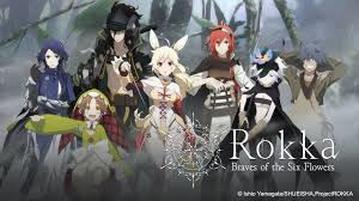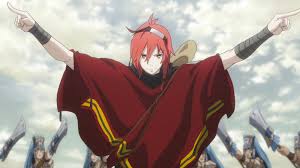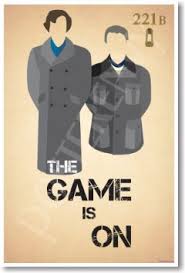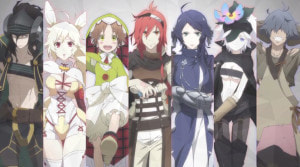|
If we’ve ever had a conversation about a TV show or anime, you’ll know that I hate waiting week-to-week to watch a show. I don’t need the show to be entirely done when I start watching, but I need to have an arch complete before committing. I mean, sure, I’ve fallen for the trap of a friend saying that I “just have to watch it now. It’s so good.” Recently I fell for it when Is it Wrong to Pick Up a Girl in a Dungeon? and I refused to do it again, despite that show being spectacular…for this season at least. So when Billy started raving about this show Rokka: Brave of the Six Flowers, I asked one question “is the first season done?” He said “no” disappointedly and we went about our business, but the minute Billy finished the last episode, he texted me that I should watch it immediately.Now I trust Billy’s opinion. He gets a bit more emotional towards shows than I do, but just by a bit; and he does have different taste than mine, but when he adamantly recommends something to me, I trust the man. As is my typical fashion, I planned to watch just a couple episodes and then get on with my day, but I’m always lying when I say that. I watched all thirteen episodes in one go and I don’t regret it even for a second. The show has incredibly interesting premise, but its setup is what really got me hooked and now I’m dying for the next installment. Rokka basically starts like any other fantasy anime. The world has a great and powerful entity that kills people and heroes must assemble to kill it before it wreaks havoc. Nothing new. In Rokka, the story specifies that the heroes rising to defeat the demon king are a part of a cycle that has continued since the first champion. After she defeated the demon king, she split her powers six ways in order to make sure future generations would also be able to defeat the demon king. However, the show doesn’t start on the six heroes intrepidly battling towards the heart of evil; instead, it starts before the six heroes have even been selected. his where I think the show reveals its genius. It doesn’t rush into the main action, nor does it try to provide a slow burn into what might eventually get intense. It opens with the protagonist interrupting a holy tournament that would usually result in the victor being selected to be one of the six heroes. He brazenly strolls in and claims he is the “Strongest man in the world” which if you looked at him, you’d most likely think otherwise. However, the show really does like to play with the word ‘strength’ and how it isn’t necessarily measured by the density of your muscles. Strength can come from power, intelligence, diligence, technical skill, or from any number of different traits; though, I’ll let Cole delve more into how that kind of mentality can benefit your life. Like I said, the show has genius, not just for its idealized characters, but for its story and pacing.
Not only was this transition an interesting twist, but it was done so smoothly, you almost forget what the characters were doing there in the first place. I was immersed in how the heroes were going to discover the imposter. All the while, the audience isn’t given any dramatic irony as to who it might be. Our only guarantee, and even it had holes, was that Adlet was most likely not the fake. For me, this was the Reese’s Phenomenon done perfectly, but it didn’t stop there. The show also has a compelling and fully realized cast; each character is three dimensional. On top of that, they even managed to slip in a subtle love subplot. In fact, it was so subtle, I wasn’t even sure if I read the situation right in the first place. As a result, it only fueled my distrust to the characters who hadn’t been cleared of guilt. Rokka did have its pitfalls though. I want to avoid spoilers, so I won’t mention many, but I will note that after the mystery is solved, the very ending is a little disappointing. However, regardless of how they left the ‘to be continued’ stamp, I’m excited to see what happens next. Rokka hit that sweet spot in the Reese’s Phenomenon, but it also built a great foundation in its first season. I’ll touch on this storytelling technique more in the weeks to come, but in reference to Rokka, the show made us ask the question “will the demon king be defeated?” And it didn’t even come close to answering that question in its first season. It instead developed its cast, themes, and tone all while keeping interests piqued and making its audience ask questions that may help us discover its overarching question about the demon king.
I have more to say about this show and about the storytelling technique of making an audience ask a question, but this is all I have in me for tonight. I’ll talk more next week; and hey, in the meantime, you can go binge watch Rokka. You know you want to…
0 Comments
Leave a Reply. |
Archives
February 2016
Categories |





 RSS Feed
RSS Feed
